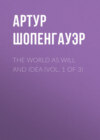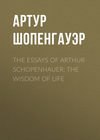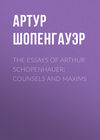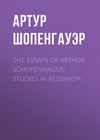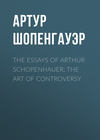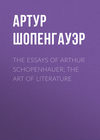Read the book: «The World as Will and Idea (Vol. 1 of 3)», page 22
Now the nature of man consists in this, that his will strives, is satisfied and strives anew, and so on for ever. Indeed, his happiness and well-being consist simply in the quick transition from wish to satisfaction, and from satisfaction to a new wish. For the absence of satisfaction is suffering, the empty longing for a new wish, languor, ennui. And corresponding to this the nature of melody is a constant digression and deviation from the key-note in a thousand ways, not only to the harmonious intervals to the third and dominant, but to every tone, to the dissonant sevenths and to the superfluous degrees; yet there always follows a constant return to the key-note. In all these deviations melody expresses the multifarious efforts of will, but always its satisfaction also by the final return to an harmonious interval, and still more, to the key-note. The composition of melody, the disclosure in it of all the deepest secrets of human willing and feeling, is the work of genius, whose action, which is more apparent here than anywhere else, lies far from all reflection and conscious intention, and may be called an inspiration. The conception is here, as everywhere in art, unfruitful. The composer reveals the inner nature of the world, and expresses the deepest wisdom in a language which his reason does not understand; as a person under the influence of mesmerism tells things of which he has no conception when he awakes. Therefore in the composer, more than in any other artist, the man is entirely separated and distinct from the artist. Even in the explanation of this wonderful art, the concept shows its poverty and limitation. I shall try, however, to complete our analogy. As quick transition from wish to satisfaction, and from satisfaction to a new wish, is happiness and well-being, so quick melodies without great deviations are cheerful; slow melodies, striking painful discords, and only winding back through many bars to the keynote are, as analogous to the delayed and hardly won satisfaction, sad. The delay of the new excitement of will, languor, could have no other expression than the sustained keynote, the effect of which would soon be unbearable; very monotonous and unmeaning melodies approach this effect. The short intelligible subjects of quick dance-music seem to speak only of easily attained common pleasure. On the other hand, the Allegro maestoso, in elaborate movements, long passages, and wide deviations, signifies a greater, nobler effort towards a more distant end, and its final attainment. The Adagio speaks of the pain of a great and noble effort which despises all trifling happiness. But how wonderful is the effect of the minor and major! How astounding that the change of half a tone, the entrance of a minor third instead of a major, at once and inevitably forces upon us an anxious painful feeling, from which again we are just as instantaneously delivered by the major. The Adagio lengthens in the minor the expression of the keenest pain, and becomes even a convulsive wail. Dance-music in the minor seems to indicate the failure of that trifling happiness which we ought rather to despise, seems to speak of the attainment of a lower end with toil and trouble. The inexhaustibleness of possible melodies corresponds to the inexhaustibleness of Nature in difference of individuals, physiognomies, and courses of life. The transition from one key to an entirely different one, since it altogether breaks the connection with what went before, is like death, for the individual ends in it; but the will which appeared in this individual lives after him as before him, appearing in other individuals, whose consciousness, however, has no connection with his.
But it must never be forgotten, in the investigation of all these analogies I have pointed out, that music has no direct, but merely an indirect relation to them, for it never expresses the phenomenon, but only the inner nature, the in-itself of all phenomena, the will itself. It does not therefore express this or that particular and definite joy, this or that sorrow, or pain, or horror, or delight, or merriment, or peace of mind; but joy, sorrow, pain, horror, delight, merriment, peace of mind themselves, to a certain extent in the abstract, their essential nature, without accessories, and therefore without their motives. Yet we completely understand them in this extracted quintessence. Hence it arises that our imagination is so easily excited by music, and now seeks to give form to that invisible yet actively moved spirit-world which speaks to us directly, and clothe it with flesh and blood, i. e., to embody it in an analogous example. This is the origin of the song with words, and finally of the opera, the text of which should therefore never forsake that subordinate position in order to make itself the chief thing and the music a mere means of expressing it, which is a great misconception and a piece of utter perversity; for music always expresses only the quintessence of life and its events, never these themselves, and therefore their differences do not always affect it. It is precisely this universality, which belongs exclusively to it, together with the greatest determinateness, that gives music the high worth which it has as the panacea for all our woes. Thus, if music is too closely united to the words, and tries to form itself according to the events, it is striving to speak a language which is not its own. No one has kept so free from this mistake as Rossini; therefore his music speaks its own language so distinctly and purely that it requires no words, and produces its full effect when rendered by instruments alone.
According to all this, we may regard the phenomenal world, or nature, and music as two different expressions of the same thing, which is therefore itself the only medium of their analogy, so that a knowledge of it is demanded in order to understand that analogy. Music, therefore, if regarded as an expression of the world, is in the highest degree a universal language, which is related indeed to the universality of concepts, much as they are related to the particular things. Its universality, however, is by no means that empty universality of abstraction, but quite of a different kind, and is united with thorough and distinct definiteness. In this respect it resembles geometrical figures and numbers, which are the universal forms of all possible objects of experience and applicable to them all a priori, and yet are not abstract but perceptible and thoroughly determined. All possible efforts, excitements, and manifestations of will, all that goes on in the heart of man and that reason includes in the wide, negative concept of feeling, may be expressed by the infinite number of possible melodies, but always in the universal, in the mere form, without the material, always according to the thing-in-itself, not the phenomenon, the inmost soul, as it were, of the phenomenon, without the body. This deep relation which music has to the true nature of all things also explains the fact that suitable music played to any scene, action, event, or surrounding seems to disclose to us its most secret meaning, and appears as the most accurate and distinct commentary upon it. This is so truly the case, that whoever gives himself up entirely to the impression of a symphony, seems to see all the possible events of life and the world take place in himself, yet if he reflects, he can find no likeness between the music and the things that passed before his mind. For, as we have said, music is distinguished from all the other arts by the fact that it is not a copy of the phenomenon, or, more accurately, the adequate objectivity of will, but is the direct copy of the will itself, and therefore exhibits itself as the metaphysical to everything physical in the world, and as the thing-in-itself to every phenomenon. We might, therefore, just as well call the world embodied music as embodied will; and this is the reason why music makes every picture, and indeed every scene of real life and of the world, at once appear with higher significance, certainly all the more in proportion as its melody is analogous to the inner spirit of the given phenomenon. It rests upon this that we are able to set a poem to music as a song, or a perceptible representation as a pantomime, or both as an opera. Such particular pictures of human life, set to the universal language of music, are never bound to it or correspond to it with stringent necessity; but they stand to it only in the relation of an example chosen at will to a general concept. In the determinateness of the real, they represent that which music expresses in the universality of mere form. For melodies are to a certain extent, like general concepts, an abstraction from the actual. This actual world, then, the world of particular things, affords the object of perception, the special and individual, the particular case, both to the universality of the concepts and to the universality of the melodies. But these two universalities are in a certain respect opposed to each other; for the concepts contain particulars only as the first forms abstracted from perception, as it were, the separated shell of things; thus they are, strictly speaking, abstracta; music, on the other hand, gives the inmost kernel which precedes all forms, or the heart of things. This relation may be very well expressed in the language of the schoolmen by saying the concepts are the universalia post rem, but music gives the universalia ante rem, and the real world the universalia in re. To the universal significance of a melody to which a poem has been set, it is quite possible to set other equally arbitrarily selected examples of the universal expressed in this poem corresponding to the significance of the melody in the same degree. This is why the same composition is suitable to many verses; and this is also what makes the vaudeville possible. But that in general a relation is possible between a composition and a perceptible representation rests, as we have said, upon the fact that both are simply different expressions of the same inner being of the world. When now, in the particular case, such a relation is actually given, that is to say, when the composer has been able to express in the universal language of music the emotions of will which constitute the heart of an event, then the melody of the song, the music of the opera, is expressive. But the analogy discovered by the composer between the two must have proceeded from the direct knowledge of the nature of the world unknown to his reason, and must not be an imitation produced with conscious intention by means of conceptions, otherwise the music does not express the inner nature of the will itself, but merely gives an inadequate imitation of its phenomenon. All specially imitative music does this; for example, “The Seasons,” by Haydn; also many passages of his “Creation,” in which phenomena of the external world are directly imitated; also all battle-pieces. Such music is entirely to be rejected.
The unutterable depth of all music by virtue of which it floats through our consciousness as the vision of a paradise firmly believed in yet ever distant from us, and by which also it is so fully understood and yet so inexplicable, rests on the fact that it restores to us all the emotions of our inmost nature, but entirely without reality and far removed from their pain. So also the seriousness which is essential to it, which excludes the absurd from its direct and peculiar province, is to be explained by the fact that its object is not the idea, with reference to which alone deception and absurdity are possible; but its object is directly the will, and this is essentially the most serious of all things, for it is that on which all depends. How rich in content and full of significance the language of music is, we see from the repetitions, as well as the Da capo, the like of which would be unbearable in works composed in a language of words, but in music are very appropriate and beneficial, for, in order to comprehend it fully, we must hear it twice.
In the whole of this exposition of music I have been trying to bring out clearly that it expresses in a perfectly universal language, in a homogeneous material, mere tones, and with the greatest determinateness and truth, the inner nature, the in-itself of the world, which we think under the concept of will, because will is its most distinct manifestation. Further, according to my view and contention, philosophy is nothing but a complete and accurate repetition or expression of the nature of the world in very general concepts, for only in such is it possible to get a view of that whole nature which will everywhere be adequate and applicable. Thus, whoever has followed me and entered into my mode of thought, will not think it so very paradoxical if I say, that supposing it were possible to give a perfectly accurate, complete explanation of music, extending even to particulars, that is to say, a detailed repetition in concepts of what it expresses, this would also be a sufficient repetition and explanation of the world in concepts, or at least entirely parallel to such an explanation, and thus it would be the true philosophy. Consequently the saying of Leibnitz quoted above, which is quite accurate from a lower standpoint, may be parodied in the following way to suit our higher view of music: Musica est exercitium metaphysices occultum nescientis se philosophari animi; for scire, to know, always means to have fixed in abstract concepts. But further, on account of the truth of the saying of Leibnitz, which is confirmed in various ways, music, regarded apart from its æsthetic or inner significance, and looked at merely externally and purely empirically, is simply the means of comprehending directly and in the concrete large numbers and complex relations of numbers, which otherwise we could only know indirectly by fixing them in concepts. Therefore by the union of these two very different but correct views of music we may arrive at a conception of the possibility of a philosophy of number, such as that of Pythagoras and of the Chinese in Y-King, and then interpret in this sense the saying of the Pythagoreans which Sextus Empiricus quotes (adv. Math., L. vii.): τῳ αριθμῳ δε τα παντ᾽ επεοικεν (numero cuncta assimilantur). And if, finally, we apply this view to the interpretation of harmony and melody given above, we shall find that a mere moral philosophy without an explanation of Nature, such as Socrates wanted to introduce, is precisely analogous to a mere melody without harmony, which Rousseau exclusively desired; and, in opposition to this mere physics and metaphysics without ethics, will correspond to mere harmony without melody. Allow me to add to these cursory observations a few more remarks concerning the analogy of music with the phenomenal world. We found in the second book that the highest grade of the objectification of will, man, could not appear alone and isolated, but presupposed the grades below him, as these again presupposed the grades lower still. In the same way music, which directly objectifies the will, just as the world does, is complete only in full harmony. In order to achieve its full effect, the high leading voice of the melody requires the accompaniment of all the other voices, even to the lowest bass, which is to be regarded as the origin of all. The melody itself enters as an integral part into the harmony, as the harmony enters into it, and only thus, in the full harmonious whole, music expresses what it aims at expressing. Thus also the one will outside of time finds its full objectification only in the complete union of all the steps which reveal its nature in the innumerable ascending grades of distinctness. The following analogy is also very remarkable. We have seen in the preceding book that notwithstanding the self-adaptation of all the phenomena of will to each other as regards their species, which constitutes their teleological aspect, there yet remains an unceasing conflict between those phenomena as individuals, which is visible at every grade, and makes the world a constant battle-field of all those manifestations of one and the same will, whose inner contradiction with itself becomes visible through it. In music also there is something corresponding to this. A complete, pure, harmonious system of tones is not only physically but arithmetically impossible. The numbers themselves by which the tones are expressed have inextricable irrationality. There is no scale in which, when it is counted, every fifth will be related to the keynote as 2 to 3, every major third as 4 to 5, every minor third as 5 to 6, and so on. For if they are correctly related to the keynote, they can no longer be so to each other; because, for example, the fifth must be the minor third to the third, &c. For the notes of the scale may be compared to actors who must play now one part, now another. Therefore a perfectly accurate system of music cannot even be thought, far less worked out; and on this account all possible music deviates from perfect purity; it can only conceal the discords essential to it by dividing them among all the notes, i. e., by temperament. On this see Chladni's “Akustik,” § 30, and his “Kurze Uebersicht der Schall- und Klanglehre.”64
I might still have something to say about the way in which music is perceived, namely, in and through time alone, with absolute exclusion of space, and also apart from the influence of the knowledge of causality, thus without understanding; for the tones make the æsthetic impression as effect, and without obliging us to go back to their causes, as in the case of perception. I do not wish, however, to lengthen this discussion, as I have perhaps already gone too much into detail with regard to some things in this Third Book, or have dwelt too much on particulars. But my aim made it necessary, and it will be the less disapproved if the importance and high worth of art, which is seldom sufficiently recognised, be kept in mind. For if, according to our view, the whole visible world is just the objectification, the mirror, of the will, conducting it to knowledge of itself, and, indeed, as we shall soon see, to the possibility of its deliverance; and if, at the same time, the world as idea, if we regard it in isolation, and, freeing ourselves from all volition, allow it alone to take possession of our consciousness, is the most joy-giving and the only innocent side of life; we must regard art as the higher ascent, the more complete development of all this, for it achieves essentially just what is achieved by the visible world itself, only with greater concentration, more perfectly, with intention and intelligence, and therefore may be called, in the full significance of the word, the flower of life. If the whole world as idea is only the visibility of will, the work of art is to render this visibility more distinct. It is the camera obscura which shows the objects more purely, and enables us to survey them and comprehend them better. It is the play within the play, the stage upon the stage in “Hamlet.”
The pleasure we receive from all beauty, the consolation which art affords, the enthusiasm of the artist, which enables him to forget the cares of life, – the latter an advantage of the man of genius over other men, which alone repays him for the suffering that increases in proportion to the clearness of consciousness, and for the desert loneliness among men of a different race, – all this rests on the fact that the in-itself of life, the will, existence itself, is, as we shall see farther on, a constant sorrow, partly miserable, partly terrible; while, on the contrary, as idea alone, purely contemplated, or copied by art, free from pain, it presents to us a drama full of significance. This purely knowable side of the world, and the copy of it in any art, is the element of the artist. He is chained to the contemplation of the play, the objectification of will; he remains beside it, does not get tired of contemplating it and representing it in copies; and meanwhile he bears himself the cost of the production of that play, i. e., he himself is the will which objectifies itself, and remains in constant suffering. That pure, true, and deep knowledge of the inner nature of the world becomes now for him an end in itself: he stops there. Therefore it does not become to him a quieter of the will, as, we shall see in the next book, it does in the case of the saint who has attained to resignation; it does not deliver him for ever from life, but only at moments, and is therefore not for him a path out of life, but only an occasional consolation in it, till his power, increased by this contemplation and at last tired of the play, lays hold on the real. The St. Cecilia of Raphael may be regarded as a representation of this transition. To the real, then, we now turn in the following book.
